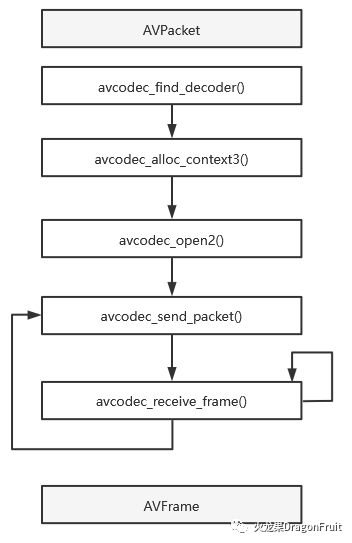The previous section analyzes and decapsulates. The output of decapsulation is compressed data, which needs to be decoded. Today we will analyze the decoding process:
Basic process :

AVPacket: audio and video compression data structure; decoder input;
Decoder initialization:
-
avcodec_find_decoder(): find decoder;
AVCodec *avcodec_find_decoder(enum AVCodecID id);-
avcodec_alloc_context3(): allocate AVCodecContext;
AVCodecContext *avcodec_alloc_context3(const AVCodec *codec);-
avcodec_open2(): Open the decoder:
int avcodec_open2(AVCodecContext *avctx, const AVCodec *codec, AVDictionary **options);-
avcodec_send_packet: Input data to decoder:
int avcodec_send_packet(AVCodecContext *avctx, const AVPacket *avpkt);
-
avcodec_receive_frame: Output data from decoder:
int avcodec_receive_frame(AVCodecContext *avctx, AVFrame *frame);
AVFrame: The decoded output data structure, the output of the decoder;
Official Demo :
decode_audio.c:
static void decode(AVCodecContext *dec_ctx, AVPacket *pkt, AVFrame *frame,FILE *outfile){int i, ch;int ret, data_size;//往decoder发送压缩数据/* send the packet with the compressed data to the decoder */ret = avcodec_send_packet(dec_ctx, pkt);if (ret < 0) {fprintf(stderr, "Error submitting the packet to the decoder\n");exit(1);}/* read all the output frames (in general there may be any number of them */while (ret >= 0) {//获取解码数据ret = avcodec_receive_frame(dec_ctx, frame);if (ret == AVERROR(EAGAIN) || ret == AVERROR_EOF)return;else if (ret < 0) {fprintf(stderr, "Error during decoding\n");exit(1);}data_size = av_get_bytes_per_sample(dec_ctx->sample_fmt);if (data_size < 0) {/* This should not occur, checking just for paranoia */fprintf(stderr, "Failed to calculate data size\n");exit(1);}//将解码的数据写文件;for (i = 0; i < frame->nb_samples; i++)for (ch = 0; ch < dec_ctx->channels; ch++)fwrite(frame->data[ch] + data_size*i, 1, data_size, outfile);}}int main(int argc, char **argv){const char *outfilename, *filename;const AVCodec *codec;AVCodecContext *c= NULL;AVCodecParserContext *parser = NULL;int len, ret;FILE *f, *outfile;uint8_t inbuf[AUDIO_INBUF_SIZE + AV_INPUT_BUFFER_PADDING_SIZE];uint8_t *data;size_t data_size;AVPacket *pkt;AVFrame *decoded_frame = NULL;enum AVSampleFormat sfmt;int n_channels = 0;const char *fmt;if (argc <= 2) {fprintf(stderr, "Usage: %s <input file> <output file>\n", argv[0]);exit(0);}filename = argv[1];outfilename = argv[2];pkt = av_packet_alloc();//查找到MP2 deocoder/* find the MPEG audio decoder */codec = avcodec_find_decoder(AV_CODEC_ID_MP2);if (!codec) {fprintf(stderr, "Codec not found\n");exit(1);}//这里输入文件是压缩音频码流,借且parser获取AVPacket数据//AVParser初始化parser = av_parser_init(codec->id);if (!parser) {fprintf(stderr, "Parser not found\n");exit(1);}//分配AVCodecContextc = avcodec_alloc_context3(codec);if (!c) {fprintf(stderr, "Could not allocate audio codec context\n");exit(1);}//打开decoder/* open it */if (avcodec_open2(c, codec, NULL) < 0) {fprintf(stderr, "Could not open codec\n");exit(1);}f = fopen(filename, "rb");if (!f) {fprintf(stderr, "Could not open %s\n", filename);exit(1);}outfile = fopen(outfilename, "wb");if (!outfile) {av_free(c);exit(1);}/* decode until eof */data = inbuf;data_size = fread(inbuf, 1, AUDIO_INBUF_SIZE, f);while (data_size > 0) {if (!decoded_frame) {if (!(decoded_frame = av_frame_alloc())) {fprintf(stderr, "Could not allocate audio frame\n");exit(1);}}//通过parser获取AVPacket数据ret = av_parser_parse2(parser, c, &pkt->data, &pkt->size,data, data_size,AV_NOPTS_VALUE, AV_NOPTS_VALUE, 0);if (ret < 0) {fprintf(stderr, "Error while parsing\n");exit(1);}data += ret;data_size -= ret;//调用decode函数进行解码if (pkt->size)decode(c, pkt, decoded_frame, outfile);if (data_size < AUDIO_REFILL_THRESH) {memmove(inbuf, data, data_size);data = inbuf;len = fread(data + data_size, 1,AUDIO_INBUF_SIZE - data_size, f);if (len > 0)data_size += len;}}//最后刷新decoder内部缓冲数据/* flush the decoder */pkt->data = NULL;pkt->size = 0;decode(c, pkt, decoded_frame, outfile);/* print output pcm infomations, because there have no metadata of pcm */sfmt = c->sample_fmt;if (av_sample_fmt_is_planar(sfmt)) {const char *packed = av_get_sample_fmt_name(sfmt);printf("Warning: the sample format the decoder produced is planar ""(%s). This example will output the first channel only.\n",packed ? packed : "?");sfmt = av_get_packed_sample_fmt(sfmt);}n_channels = c->channels;if ((ret = get_format_from_sample_fmt(&fmt, sfmt)) < 0)goto end;printf("Play the output audio file with the command:\n""ffplay -f %s -ac %d -ar %d %s\n",fmt, n_channels, c->sample_rate,outfilename);end:fclose(outfile);fclose(f);avcodec_free_context(&c);av_parser_close(parser);av_frame_free(&decoded_frame);av_packet_free(&pkt);return 0;}
The above example is an officially provided example of decoding and reading MP2 audio bare streams from a file, and you need to use AVParser to obtain AVPacket. See decode_video.c for an example of decoding a bare video stream. The process is the same.
In most cases, we obtain AVPacket through av_read_frame. For specific examples, see demux_decoding.c. The decoding process is the same, except that before avcodec_open2 opens the decoder, we need to call avcodec_parameters_to_context() to copy the codec parameters from AVStream to AVCodecContext middle:
int avcodec_parameters_to_context(AVCodecContext *codec,const AVCodecParameters *par);